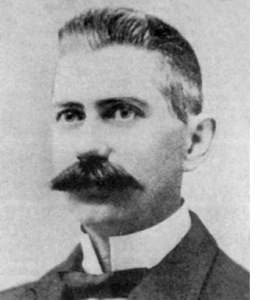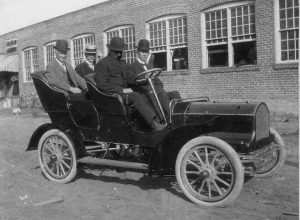By Matt Wolfe
May 19, 1903, David Dunbar Buick incorporates the Buick Motor Company in Detroit.
David Buick (pictured below) was blessed with great mechanical ability but cursed with poor business acumen. Born in Scotland in 1854, Buick moved to Detroit with his family at the age of two. He left school at 13 to work for a plumbing company, which he and a partner later took over. It was there that Buick began to show promise as an inventor, producing many innovations including a lawn sprinkler and a technique to affix enamel to cast iron, making possible today’s rust-free sinks and bathtubs.
 Though the plumbing company became a financial success, by the 1890’s Buick had begun to develop an interest in internal combustion engines. He sold his plumbing business to form the Buick Auto-Vim and Power Company to experiment with gasoline motors in his workshop. After years of toiling, Buick produced his first car in 1902. However, its development costs were enormous and Buick ran out of capital. He had to raise money to get his automobile company rolling again, incorporating the Buick Motor Company in 1903 with a loan from fellow car enthusiast Benjamin Briscoe.
Though the plumbing company became a financial success, by the 1890’s Buick had begun to develop an interest in internal combustion engines. He sold his plumbing business to form the Buick Auto-Vim and Power Company to experiment with gasoline motors in his workshop. After years of toiling, Buick produced his first car in 1902. However, its development costs were enormous and Buick ran out of capital. He had to raise money to get his automobile company rolling again, incorporating the Buick Motor Company in 1903 with a loan from fellow car enthusiast Benjamin Briscoe.
Buick sold the company shortly after it was incorporated, but stayed on as a manager. The company was finally able to sell cars to the public in 1904 with the introduction of the Model B. Built in Flint, Michigan. The Model B was one of the first cars to employ an overhead valve engine, a concept Buick himself helped refine that is still in use today. Unfortunately, the company ran out of money again within the year and William C. Durant was brought in as a controlling investor. It was Durant who helped turn the company into one of the best-selling automobile brands in the U.S., succeeding where Buick and his investors had failed.
Buick would leave the company he founded in 1906, taking a severance package before it was incorporated into General Motors in 1908. In the coming years, David Buick would make several unsuccessful real-estate and manufacturing investments. At the time of his death in 1929, Buick was nearly broke. In contrast, the Buick Motor Company became extremely profitable for General Motors. Adding insult to injury, Buick had sold his Buick stock to Durant upon his departure in 1906. Despite his failed business ventures, Buick remained a determined and resolute man up until the end of his life, believing “The failure is the man who stays down when he falls.”
